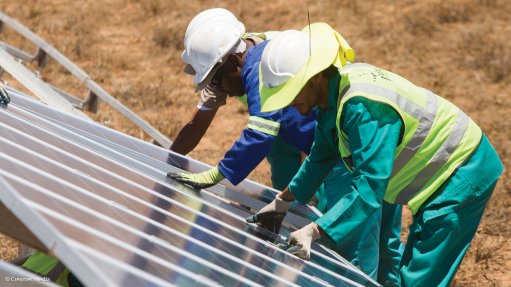Sasol expects full-year earnings to more than double
Chemicals and energy company Sasol reports that its earnings a share for the financial year ended June 30, are expected to be between R12 and R18, compared with the loss a share of R148.49 reported for the 2020 financial year.
Sasol’s headline earnings per share (HEPS) are also expected to be significantly higher year-on-year at between R39 and R41, compared with the HEPS of R11.50 reported for the prior financial year
In addition, the company notes that its core HEPS (CHEPS) are expected to be between R27 and R30, compared with the CHEPS of R15.08 reported for the 2020 financial year.
Sasol’s adjusted earnings before interest, taxes, depreciation and amortisation (Ebitda) are expected to increase by between 32% and 49%, from R35-billion in the 2020 financial year, to between R46-billion and R52-billion.
The company’s performance was underpinned by a notable gross margin recovery in the second half of the financial year, combined with strong cost, working capital and capital expenditure performance despite the effects of the Covid-19 pandemic and weather-related events in the US.
The company’s performance was further boosted by a strong recovery in chemical prices and a 4% increase in the rand per barrel price of Brent crude oil, partly offset by weather-related events in both the US and South Africa impacting on Sasol’s gross margins adversely.
Sasol’s adjusted Ebitda was supported by a strong cost performance through what it says is better-than-planned delivery of the $1-billion comprehensive crisis response plan commitment, as well as early delivery on the Sasol 2.0 initiative.
In this regard, the company points out that, on July 6, the National Energy Regulator of South Africa published a final decision on the maximum gas price methodology for Sasol Gas – a subsidiary of Sasol South Africa – which determined the maximum price methodology for piped gas sold in South Africa for the period 2014 to 2021 and beyond.
Taking this into account, Sasol’s 2021 financial year results were adjusted accordingly to include a provision for the potential retrospective payment obligation.
Notable non-cash adjustments (before taxation) for the 2021 financial year include unrealised gains of R10.3-billion on the translation of monetary assets and liabilities and valuation of financial instruments and derivative contracts.
They also include remeasurement items of R23.2-billion, which is mainly a result of an impairment of R24.5-billion on Sasol’s synfuels refinery cash generating unit (CGU), largely owing to a stronger forecasted rand:dollar exchange rate, which impacted negatively on the forecasted basic fuel price.
Further, Sasol reports that another pre-tax noncash adjustment was the R7.9-billion impairment on the wax value chain, driven by higher future liquified natural gas (LNG) imports and Mozambique gas costs, as well as a stronger forecasted rand:dollar exchange rate.
However, these impairments were partly offset by a reversal of a prior year impairment of R4.9-billion, relating to the US ethylene oxide/ethylene glycol (EO/EG) CGU after the Ziegler alcohols unit (Ziegler) reached beneficial operation in June 2020.
Given the interdependencies of the Ziegler, EO and ethoxylates units, as well as the change in regulatory environment surrounding EO, Sasol says the CGUs were reassessed and now considered to be one integrated CGU.
The impairment assessment of the combined CGU showed significant headroom, resulting in the full 2019 financial year impairment of the EO/EG CGU being reversed in the 2021 financial year.
Also, the company says its impairments were also partly offset by net profit on the disposal of businesses of R2.2-billion, including the air separation units, and a R3.4-billion gain on the realisation of the foreign currency translation reserve, mainly on the divestment of a 50% interest in the Lake Charles Chemicals Project base chemicals business.
Comments
Press Office
Announcements
What's On
Subscribe to improve your user experience...
Option 1 (equivalent of R125 a month):
Receive a weekly copy of Creamer Media's Engineering News & Mining Weekly magazine
(print copy for those in South Africa and e-magazine for those outside of South Africa)
Receive daily email newsletters
Access to full search results
Access archive of magazine back copies
Access to Projects in Progress
Access to ONE Research Report of your choice in PDF format
Option 2 (equivalent of R375 a month):
All benefits from Option 1
PLUS
Access to Creamer Media's Research Channel Africa for ALL Research Reports, in PDF format, on various industrial and mining sectors
including Electricity; Water; Energy Transition; Hydrogen; Roads, Rail and Ports; Coal; Gold; Platinum; Battery Metals; etc.
Already a subscriber?
Forgotten your password?
Receive weekly copy of Creamer Media's Engineering News & Mining Weekly magazine (print copy for those in South Africa and e-magazine for those outside of South Africa)
➕
Recieve daily email newsletters
➕
Access to full search results
➕
Access archive of magazine back copies
➕
Access to Projects in Progress
➕
Access to ONE Research Report of your choice in PDF format
RESEARCH CHANNEL AFRICA
R4500 (equivalent of R375 a month)
SUBSCRIBEAll benefits from Option 1
➕
Access to Creamer Media's Research Channel Africa for ALL Research Reports on various industrial and mining sectors, in PDF format, including on:
Electricity
➕
Water
➕
Energy Transition
➕
Hydrogen
➕
Roads, Rail and Ports
➕
Coal
➕
Gold
➕
Platinum
➕
Battery Metals
➕
etc.
Receive all benefits from Option 1 or Option 2 delivered to numerous people at your company
➕
Multiple User names and Passwords for simultaneous log-ins
➕
Intranet integration access to all in your organisation

















